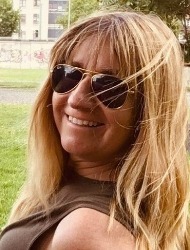Cora Granata, Ph.D.
Professor of History
Biography
Cora Granata is Professor of History at California State University, Fullerton. A fluent German speaker and LA native, Dr. Granata has lived, studied, and conducted research in Berlin and other German cities many times over the course of her life. Her own first study abroad experience as an undergraduate at University of California, Berkeley was in Berlin. She interned at a bank in Berlin just six months after the fall of the infamous Berlin Wall. She then lived in Bonn, working as a legislative intern at the German Parliament (the Bundestag) through the Internationales Parlaments-Stipendium. She received her master’s degree at Georgetown University’s Center for German and European Studies (Walsh School of Foreign Service), before receiving her Ph.D. in modern German history at the University of North Carolina at Chapel Hill under the director of Konrad Jarausch. She spent a year living in Berlin conducting research for her dissertation as a Chancellor’s Fellow (Bundeskanzler Fellowship). She has published award-winning research on the history of Jews and Sorbs, a small Slavic-speaking minority, in East Germany, with a special interest in the complex interplay between state and everyday society in the GDR dictatorship.
Prof. Granata has been an Alexander von Humboldt Foundation Fellow and Visiting Professor at the Friedrich-Meinecke Institute of the Freie Universität Berlin. She has become deeply engaged with promoting transatlantic partnerships between her university and oral and public history organizations based in Germany. These efforts have resulted in a long-standing collaboration that has brought the Berlin-based Lange Tafel (Long Table) oral history public installation to Los Angeles several times, through the efforts of Dr. Granata and her student teams. The Lange Tafel celebrates community stories in a public-open air setting, promoting intercultural and intergenerational dialogue. For more information, visit Long Table Los Angeles's website.
Research Areas
Cultural Minority Politics in the German Democratic Republic, Oral History, Holocaust Studies, Jews in Germany, Sorbs, Gender Studies.
Her current research project Heimat on the Pacific examines the memories of Germans who lived through World War II in Europe and later migrated to California. Drawing on an ambitious oral history project that has collected over 100 oral histories, this project contrasts the World War II memory cultures of Germans in diaspora in California with those who remained in Germany in the postwar period. The existing scholarship on Germans in California focuses on the prominent progressive, anti-Nazi writers, musicians, and artists who came to LA as anti-fascist émigrés in the 1930s and 1940s. Her research challenges this historiography by highlighting that LA in the postwar period also welcomed more conservative and nationalistic Germans, many of whom comfortably integrated into and in turn shaped the growing conservative movement in places like postwar Orange County.
Courses Regularly Taught
- Led 5-week Study Abroad Program in Berlin (2016, 2019, 2023)
- Residential Faculty Member, Cal State DC Internship Program, Summer 2024
- Europe Since 1945
- History of Modern Europe
- Modern German History
- History of the Holocaust
- After the Holocaust: Holocaust Memories in Post-1945 Central Europe
- European Identities in the Twentieth Century
- Graduate Research and Readings Seminars on Modern European Nationalism and Microhistory
- World Civilizations Since the 1500s
- Oral History
Publications
Select Publications
The Human Tradition in Modern Europe (Lanham, MD: Rowman & Littlefield Publishers, 2008
“Why erasing California’s anti-Semitic, racist history from public display is the wrong move,” Los Angeles Times (April 6, 2016).
“Political Upheaval and Shifting Identities: Holocaust Survivors in the Soviet Occupied Zone of Germany, 1945-1949,” in Lessons and Legacies X: Reexamining Perpetrators, Victims, and Bystanders, ed. Sara R. Horowitz (Evanston: Northwestern University Press, 2012), 123-140.
From Hitler’s Europe to the Golden State Oral History Project: Center for Oral and Public History, California State University Fullerton, OHP 253. Project Director and Interviewer, Cora A. Granata. 85 Interviews, 2011-2014.
“The Cold War Politics of Cultural Minorities: Jews and Sorbs in the German Democratic Republic, 1976-1989,” German History 27, no. 1 (January 2009): 60-83.
“Why not all Germans Celebrated the Fall of the Berlin Wall: East German Jews and the Collapse of Communism,” in The Human Tradition in Modern Europe, ed. Cora Granata and Cheryl Koos (Lanham, MD: Rowman & Littlefield Publishers, 2008), 199-213.
“‘The Ethnic Straight Jacket’: Bilingual Education and Grassroots Agency in the Soviet Occupied Zone and German Democratic Republic, 1945-1964,” German Studies Review 29, no. 2 (May 2006): 331-46. ** Recipient of 2008 German Studies Association Best Article Prize **
“‘Das hat in der DDR keine Rolle gespielt, was man war.’ Ostalgie und Erinnerungen an Antisemitismus in der DDR, 1949-1960,” in Zwischen Politik und Kultur: Juden in der DDR, ed. Moshe Zuckermann (Göttingen: Wallstein Verlag, 2002), 82-100.
“Multikulturalismus aus Deutsch-Amerikanischer Sicht,” in Was bleibt von der Vergangenheit? Die junge Generation im Dialog über den Holocaust. Mit einem Beitrag von Roman Herzog (Berlin: Christoph-Links Verlag, 1999), 230-37.
Awards and Prizes
- Alexander von Humboldt Foundation Fellow
- History Department Outstanding Faculty Member
- CSUF Outstanding Teacher Scholar for Promotion of International Education
- CSUF Outstanding Scholarly and Creative Activity Award
- German Studies Association/DAAD Best Article Prize

